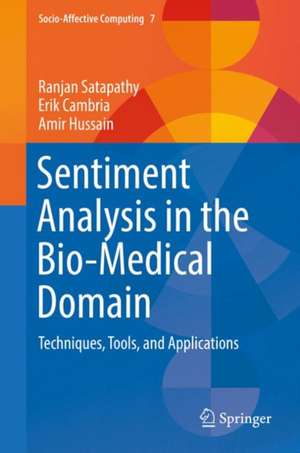Sentiment Analysis in the Bio-Medical Domain: Techniques, Tools, and Applications: Socio-Affective Computing, cartea 7
Autor Ranjan Satapathy, Erik Cambria, Amir Hussainen Limba Engleză Hardback – feb 2018
The readers will discover the following key novelties:
1) development of a bio-medical lexicon: WME expansion and WME enrichment with additional features.;
2) ensemble of machine learning and computational creativity;
3) development of microtext analysis techniques to overcome the inconsistency in social communication.
It will be of interest to researchers in the fields of socially-intelligent human-machine interaction and biomedical text mining
| Toate formatele și edițiile | Preț | Express |
|---|---|---|
| Paperback (1) | 964.77 lei 38-44 zile | |
| Springer International Publishing – 6 iun 2019 | 964.77 lei 38-44 zile | |
| Hardback (1) | 1093.88 lei 3-5 săpt. | |
| Springer International Publishing – feb 2018 | 1093.88 lei 3-5 săpt. |
Preț: 1093.88 lei
Preț vechi: 1151.45 lei
-5% Nou
Puncte Express: 1641
Preț estimativ în valută:
209.38€ • 227.51$ • 175.99£
209.38€ • 227.51$ • 175.99£
Carte disponibilă
Livrare economică 31 martie-14 aprilie
Preluare comenzi: 021 569.72.76
Specificații
ISBN-13: 9783319684673
ISBN-10: 3319684671
Pagini: 129
Ilustrații: XXIV, 134 p. 45 illus., 33 illus. in color.
Dimensiuni: 155 x 235 mm
Greutate: 0.41 kg
Ediția:1st ed. 2017
Editura: Springer International Publishing
Colecția Springer
Seria Socio-Affective Computing
Locul publicării:Cham, Switzerland
ISBN-10: 3319684671
Pagini: 129
Ilustrații: XXIV, 134 p. 45 illus., 33 illus. in color.
Dimensiuni: 155 x 235 mm
Greutate: 0.41 kg
Ediția:1st ed. 2017
Editura: Springer International Publishing
Colecția Springer
Seria Socio-Affective Computing
Locul publicării:Cham, Switzerland
Cuprins
Introduction.- Literature Survey.- SenticNet.- Contribution to Sentiment Analysis.- Conclusion and Future Work.- Index.
Notă biografică
Mr. Ranjan Satapathy is currently pursuing Ph.D., at the School of Computer Science and Engg., NTU Singapore under the supervision of Dr. Erik Cambria. His major research interests are deep learning, sentiment analysis and natural language processing.
He completed his Bachelor's degree in Computer Science and Engg., from IIIT-Bhubaneswar, India in 2013. He further recieved a M.Tech degree from University of Hyderabad, India in 2016, with majors in Computer Science. During his pursuits of Master's degree, he joined Dr. Cambria's research group SenticNet as an intern, where he worked on bio-medical sentiment analysis. This exposure and a keen-to-learn attitude motivated him to apply for Ph.D under Dr. Cambria.
Textul de pe ultima copertă
The abundance of text available in social media and health-related forums and blogs have recently attracted the interest of the public health community to use these sources for opinion mining. This book presents a lexicon-based approach to sentiment analysis in the bio-medical domain, i.e., WordNet for Medical Events (WME). This book gives an insight in handling unstructured textual data and converting it to structured machine-processable data in the bio-medical domain.
The readers will discover the following key novelties:
1) development of a bio-medical lexicon: WME expansion and WME enrichment with additional features.;
2) ensemble of machine learning and computational creativity;
3) development of microtext analysis techniques to overcome the inconsistency in social communication.
It will be of interest to researchers in the fields of socially-intelligent human-machine interaction and biomedical text mining
The readers will discover the following key novelties:
1) development of a bio-medical lexicon: WME expansion and WME enrichment with additional features.;
2) ensemble of machine learning and computational creativity;
3) development of microtext analysis techniques to overcome the inconsistency in social communication.
It will be of interest to researchers in the fields of socially-intelligent human-machine interaction and biomedical text mining
Caracteristici
Offers a novel approach to combine computational complexity and machine learning Demonstrates a construction of Medical Lexicon for the sole purpose of Sentiment Analysis in Bio-medical Domain Includes a special chapter on experimental results obtained on the medical lexicon built









